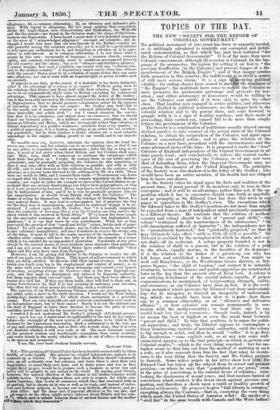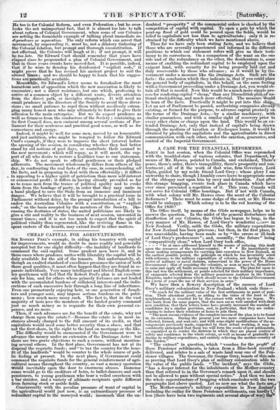TOPICS OF THE DAY.
'111E NEW " SOCIETY FOR TILE REFORM OP COLONIAL GOVKRNMENT."
No political movement of late yearei has been so urgently needed, or so strikingly calculated to relay-Mite our corrupted and debili- tated statesmanship, as that wbiciPhasjust been initiated "for the Reform of Colonial Government?' It is of far more than mere Colonial concernment, although*occasion is Colonial. In the lan- guage of the prospectus, thereaien for setting it on foot is " the growing disaffection in the owes] and present danger of a dis- memberment of the BriLtsE.napire "; and if that danger creates
little sensation in this eountI y, the indifferen in itself a Bonne
of still more serious alarm. It is a sign tying political vitalit : the ruling classes have ceased to the dominion of
" the Empire" ; the multitude have come to • the Colonies as mere preserves for aristocratic patronage ant pretexts for tax- ation ; and either aristocracy or democracy would be willing to see the Colonies cast adrift, if it were only to spite the other class. That leading men engaged in active polities, and otherwise greatly divided in political sentiments, see the danger both to the colonial relation and to the parent state, and come forward to grapple with it, is a sign of healthy, reaction ; and their mode of proceeding, duly carried out, cannot fail to do more than simply reform the government of the Colonies.
The Society is a combination of politicians usually classed among distinct parties, to take counsel on the actual state of the Colonial relation, to obtain the cooperation of the Colonies, and agree upon plans of concentrated action ; and to place the relation of the Colonies on a new basis, accordant with the circumstances and the more advanced views of the time. It is proposed to make the " true" Colonies of England independent of the Central Government in af- fairs purely local ; and correlatively to relieve the central exche- quer of the cost of governing the Colonies, or of any cost save
that of defending them, when the Imperial Government may see cause, from the enemies of the United Kingdom. The principles of the Society were foreshadowed in the letter of Mr. Godley ; who would have been an active member, if his health had not obliged him to leave our shores.
As the Society takes its stand upon the facts and realities of the
present time, it must prevail if its members only be true to their enterprise ; and it will be an advantage, rather than not, if the o position which it has to encounter should come forth as meufiil y and as promptly as Sir Edward Oast has done this week in our pages in opposition to Mr. Godley's view. The exceptions which tair Edward takes to Mr. Godley's position are not more than might be expected from a man of independent mind previously committed to a different theory. $Ie contends that the relation of mother- country and colony should be that of "parent and child,"—the colony " restrained in• the waywardness of its adolescence," " its self-emtmeipation suffered at maturity"; the independence not to be "prematurely hastened," but " gradually prepared," so that it may ultimately take effect "with as little ill-will as possible." Sir Edward is overlaid by the metaphor with which he starts, and can- not shake off its restraint. A colony properly founded is not in the relation of child to a parent, but in the relation of a part to the whole, equally mature in the faculties of its denizens : it is the relation to his father of a grown-up son who has left home and established a home of his own. You might as well call Marylebone, or the Westbourne Grove district, or Bdl- grave Square, " the child of London," and subject it to infantile treatment, because its houses and parish-apparatus are constructed later in the day than the ancient city of King Lud. A colony is an outlying detachment of the central nation, capable, if proper communications be maintained, of reciprocating strength, safety, and resources ; as our Colonies have done in fact. It is the over- lying metaphor which prevents Sir Edward Cust from understand.. ing—for he arrogates to himself an incapacity of understand- ing, which we should have been slow to in }cute —how there can be a common citizenship, or as " offensive and defensive alliance " ; or how colonies can remain permanently in con- nexion with the mother-country; or how there can be any useful bond but that of commerce,—though trade, indeed, is by, no means the best or highest or even the usual bond between "parent and child." To take that position, is to argue for politi- cal separation; and truly, Sir Edward appears to contemplate a fussy domineering exercise of parental authority, until the colony is big enough to rebel, and then he would " suffer " it to go free. He desiderates " some explicit code, or at any rate some well- enunciated opinion, as to the boat principle on which to govern our Colonial empire,"—which is the very thing required : but his me- taphor seems to shut him out from the method of arriving at suoh a code, as it also conceals from him the fact that what he deside- rates is the very thing that the Society and Mr. Godley propose to furnish. Some minor points in his letter show how little Sir Edward Cast has taken up the subject from its actual and present position,—as where he says that " population at any price; " even at the price of convictism, is the natural desire of colonies ; over- looking the disclosures of recent years, and that modern hatred of convictism which renders it the worst cheek against genuine emi- gration, and therefore a check upon a rapid or healthy growth of colonial settlements. He proposes to give "full liberty to colonies," excepting always the Customs,—that is, -excepting the very thing which made the United States of Anweica rebel ! lie speaks of a " civil list " la the same- breath with Canada and the West Indies ! He too is for Colonial Reform, and even Federation ; but he over- looks the not unimportant fact, that it is almost too late to talk about reform of Colonial Government, when some of our Colonies are setting the formidable example of talking about immediate in- dependence or separation. The only reform which can arrest that movement, by superseding it, must be, not a dilatory tinkering of the Colonial relation, but prompt and thorough reconstitution. If not effectual, the Colonies will laugh at it; if not prompt, it will be too late. Sir Edward Cust should remember that years have elapsed since he propounded a plan of Colonial Government, and that in those years events have moved fast. It is possible, indeed, that if he were to develop his desiderated "explicit code," it might prove that he has revised his ancient project to suit the altered times ; and we should be happy to learn that his sugges- tions are practically available.
Meanwhile, Sir Edward's letter seems to foreshadow the most
hazardous sort of opposition which the new association is likely to encounter ; not a direct resistance, but one which, professing to arrive at a common object by a therent route, diverts attention from the direct .path, or inveigles stragglers. It will need no small prudence in the directors of the Society to avoid these diver- sions ; no small patience to repel them without needlessly estran- ging many honest men who may ultimately be forced to give their adhesion to the main enterprise. But we do expect prudence as well as firmness from the conductors of the Society ; containing, as its first Council does, men eminent among several sections of Par- liament for their acuteness and practical good sense, as well as for earnestness and energy.
Indeed, it might be well for some men, moved by an honourable
and just ambition, who might be tempted to follow Sir Edward Cust s example, if they were to improve the short interval before the opening of the session, in considering whether they had better stand by old notions of past days, or contribute their counsel to the new movement ; which will repay, as it will merit, the sup- port of all who desire to restore a healthier tone to our statesman- ship. We do not speak to official gentlemen or their pledged adherents. The movement wholesomely differs from others of the day, in confronting the real facts of the case, in comprehending all the facts, and in proposing to deal with them effectually ; it differs
. in appealing to a higher spirit of patriotism than mere self-interest or commercial profit; it differs in having already prevailed so far as to rouse men from the trance of political apathy and to evoke them from the bondage of party, in order that they ma y unite in a band pledged to save the State from an immense and imminent e believe that it will be brought to a practical issue in Parliament without delay, by the prompt introduction of a bill to endow the Australian Colonies with a constitution, or " explicit code," on the basis accepted by the members of the Society.
Dis- cussing the destinies of states, the united politicians are likely to give a stir and reality to the business of next session, unwonted in recent times ; and it is not too much to expect that the spirit of political vitality thus regenerated, like the reviving flame in the spent embers of the hearth, may extend itself to other matters.































 Previous page
Previous page